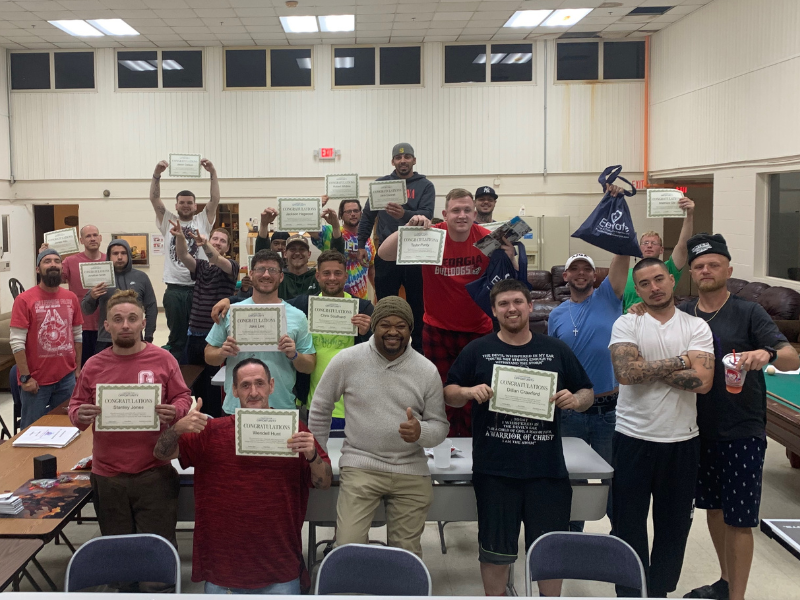
Q&A with Amber Gorman at BETTER WORK Columbus

Q&A with Amber Gorman at BETTER WORK Columbus
Amber Gorman joined the BETTER WORK Columbus team in October, 2022 as a program specialist. We recently had a chance to sit down with her and hear more about her background, what brought her to BETTER WORK, and why she is passionate about helping people who are struggling find meaningful, self-supporting work.
Q: Please tell us a little about yourself.
I come from generational poverty. I grew up very poor. I also struggled with addiction for a couple of years, but I’m now five years clean, which is great. God brought me out of that and He has also brought me out of poverty through employment and networking. Now, I have social capital which I didn’t used to have. I also have a better view of myself now than I used to. I thought that was just my life and that it wasn’t ever going to get any better. Then I got tired of living like that and I was like, “I’m going to do something different.” And I did whatever it took. It was a lot of work.
I have a criminal background as well. Looking at me on paper, most people wouldn’t hire me, but they bring me in for an interview. Then, they hear my story and they’re like, “Oh, wow! I want to give you a chance.” I’ve never been not hired because of my background, which is great in the position that I’m currently in.
A lot of the candidates that I work with at BETTER WORK Columbus deal with a lot of what I’ve already been through and overcome, so I can take my life experiences and bring that to them and help them come through that. That’s kind of me in a nutshell. As far as work experience, I feel like I’ve done it all. I’ve done it all like resorts, chicken plants, textile mills, and retail. I’ve done it all.
Q: What brought you to BETTER WORK Columbus?
I’m not from Columbus. I’m actually from Northeast Georgia, a little bitty, small town in White County. My husband and I moved down here. There just weren’t a lot of opportunities up there and he had a network down here. So, about a year after we got married, we moved down here, and then I didn’t work for a while, and then I started going back to work. It was just kind of part-time, just to kind of get out of the house.
We got involved with Fountain City Church in Columbus. Pastor Grant Collins is amazing. We love him. Before we became members, I asked him, “What’s your ministry? Who do you partner with? How are you trying to reach the community?” He told me that Jobs for Life is what they partnered with. And at the time I wasn’t working and I was like, “Oh well, I don’t know if that’s something that I would be interested in because I don’t even have a job.”
That’s when I met Kristin Barker. She was holding a Jobs for Life luncheon for employer partners at the church. I didn’t know that’s what it was. My pastor asked me to help volunteer serving food, and so I went and I got to sit through the presentation and it touched me because we didn’t have that where I was from and I had to do all of it on my own — like build my own connections and make myself more marketable to employers.
So many people need that and it gives you such an advantage in the work market place. And so after that, I was like, “I have to be a part of this.” You know, I have to and so a little bit later, Pastor Grant comes back. He asked me, ” Hey, do you want to be a facilitator for Jobs for Life?” I was hesitant. I got all nervous and I was like, “I don’t know. I don’t know if I can do it”. He said that he thinks I’d be great and so I said yes.
Kristin and I worked closely together for 13 weeks. And then the job posting came up with BETTER WORK Columbus, and she was like, ” I think you should apply for it.” I was a little worried because I didn’t have a degree or this or that and there’s my criminal background but she knew all of that. She’s heard my story and she still encouraged me to apply. And I was like, ” You know what, if God wants me to have it, then I’ll have it. ” And so I did and I applied and went through the interview process, and here I am.
Q: What’s your role at BETTER WORK?
I’m the program specialist for BETTER WORK Columbus. I’m the point of contact for candidates and am working on becoming the point of contact for employers as well. When candidates put in their applications — whether it’s for employment, training, or mentorship — I speak with them. We kind of figure out what it is exactly that they need, and what’s going to be a good fit for them. I help pair them with resources in the community as well as job opportunities. Or, if they’re interested in mentoring or having a mentor, then I partner them with that mentor as well and kind of foster that relationship.
“What really touches my heart is being able to help those people who are maybe underemployed or have just been out of the workforce for a while or moms that are trying to come into the workforce and being able to connect with those opportunities.”
“What really touches my heart is being able to help those people who are maybe underemployed or have just been out of the workforce for a while or moms that are trying to come into the workforce and being able to connect with those opportunities.”
Q: What are some of your favorite aspects of BETTER WORK’s mission?
Our positive relationship with employers is my favorite part. In Columbus there are around 300 applicants for every open job. It’s a tough environment. But with BETTER WORK, we have those relationships so we can kind of help the candidates get a foot in the door. What we’re doing though is we’re targeting people who are in poverty.
We don’t turn anybody away. I have people who come to me with Bachelor’s Degrees that’s just relocated and it’s great to be able to help them to gain employment, too. But what really touches my heart is being able to help those people who are maybe underemployed or have just been out of the workforce for a while or moms that are trying to come into the workforce and being able to connect with those opportunities. A lot of them are on government programs. Eventually, the goal is to be self-sufficient and connect them with opportunities where they can work.
It’s not just a job. It’s something that’s supposed to be long-term where they can grow. They can learn more about themselves. They learn more about the workforce and they can move up in the industry. I love being able to give those opportunities to people that want them.
Q: What are some of the things that motivate you, personally, in your work?
My hope for the future of BETTER WORK is that I want us to become the go-to place for job applicants and employers. Applicants can feel confident that we’re going to be able to place them somewhere. Employers are going to be confident that we’re going to send them people that are going to be there till they retire, and they’re going to be wonderful employees. Also, it could also reduce unemployment rates and things like that. I really want to create a childcare program. That’s what I want to do.










